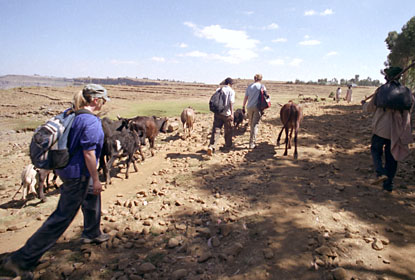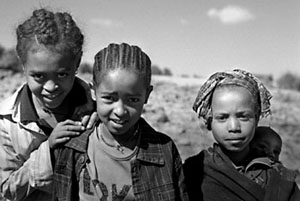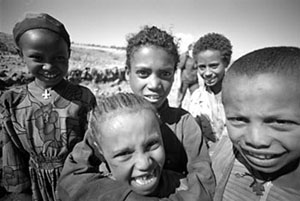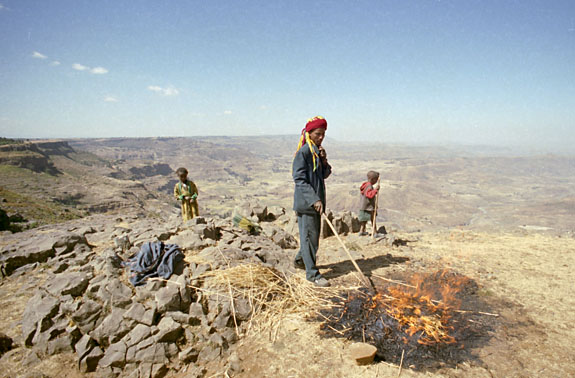Day 3: House Call
 Typical trekking terrain. Jodie, Mulay, Nina and local guide...plus farm animals |
They'd surely expected us, and had probably hosted numerous tourists in the past, but they shyly hung back in the shadows of the tukul watching us with wide eyes. In this tukul, only slightly larger than the ones we'd slept in last night, an entire family slept on a large platform lofted over their horse tied underneath. A small calf was currently tied to a stake by the door while a chicken peeked in and out of a stone coop on the floor. The family also owned seven sheep, which were outside because they could bear the heat. Unlike our camps, where dining and cooking were done in separate tukuls, here the cooking and eating were done in the same single room next to the loft.
The inner walls were coated in a thick mixture of cow dung and mud, then hollowed out to create shelves and hollows for storage. Huge ceramic urns used for carrying water and iron cookware were stored in these hollows. Mulay explained that in the rural highlands, people still believed that craftsman—mainly blacksmiths, potters and weavers—were part of a distinct lower class. Blacksmiths in particular were believed to possess the evil eye. People were being educated otherwise, but for now, they simply tolerated the artisans' necessity while shunning their communities.
 |
 |
Twenty-eight-year-old Mulugeta loved the mountains dearly and dreamed someday of living out in the community himself. Born in Lalibela, his family had moved to Addis long ago, so he'd returned to live there on his own. He knew that he was too educated for rural women but could not expect a town woman to share his dreams. In this dark hut, knowing the laborious life these cheerfully hospitable people led, I could easily imagine his dilemma.
I was constantly amazed at the experiences on this trek; after Harar, a truly tough starting point in Ethiopia, the highlands were a beautiful surprise moment after moment. The people were so warm and welcoming, so happy to see us, so excited even though TESFA had been growing in popularity to the point where the locals must have been seeing new tourists every day. I wasn't sure how they maintained that level of exuberance but I felt we were witnessing the true Ethiopian temperament—not the desperate need for sales, to cajole tourists into accepting guide services, to persistently hassle solo women. The unrestrained warmth on this trek was so touching and real.

Roasting barley on the escarpment